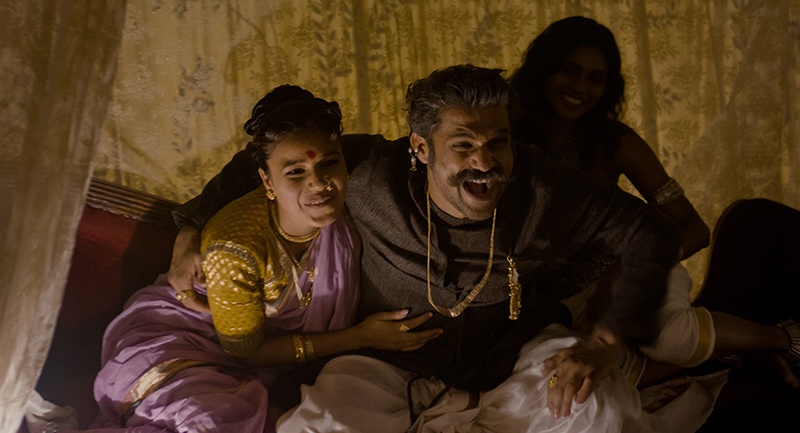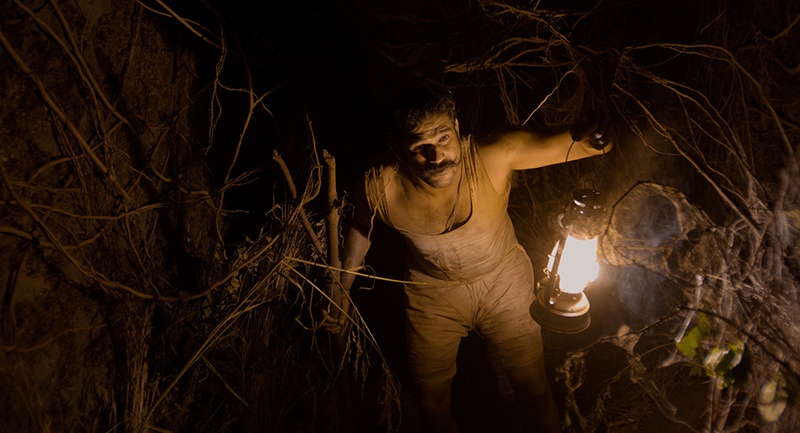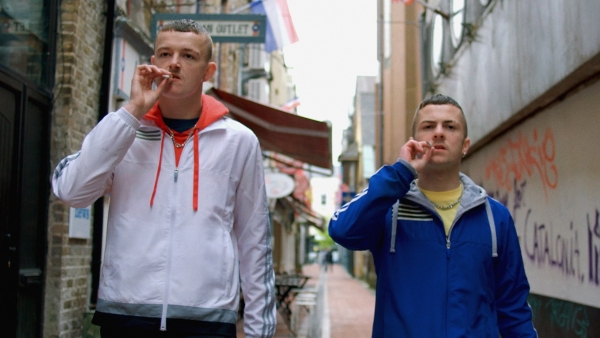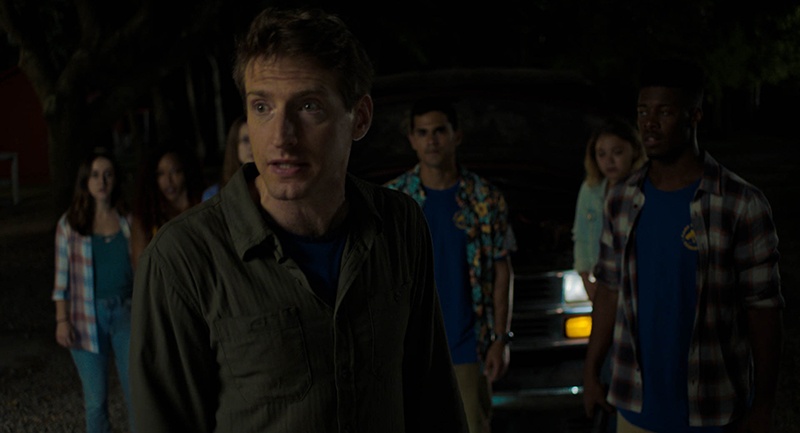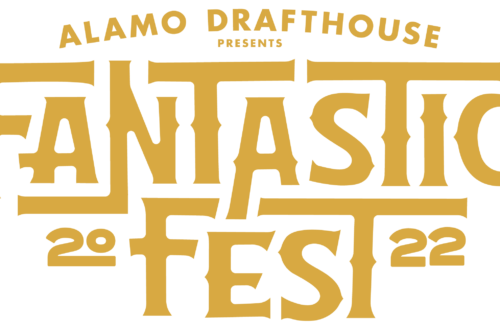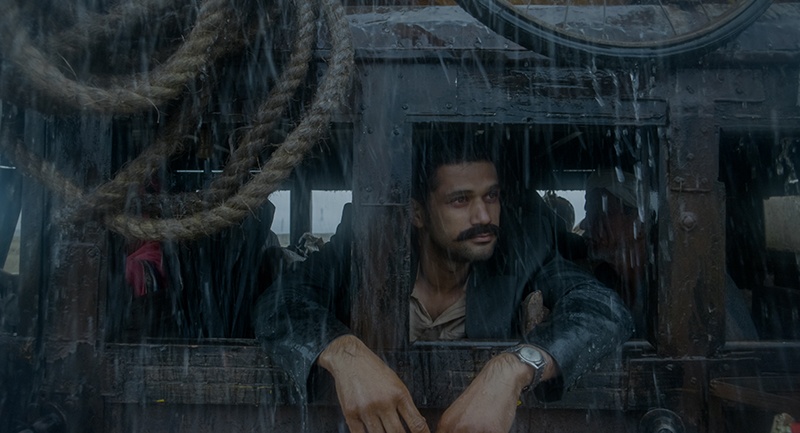 In the rural village of Tumbbad, young Vinayak has heard the stories of an ancient fortune held by his family for years, but is warned against attempting to attain the treasure lest he fall victim to the demon who guards it. He instead cares for his great-grandmother, a decrepit crone who must remain sated or her appetites might just claim them all. When she dies and he inherits the treasures housed inside a decaying estate, Vinayak discovers that they are not exactly what he expected, but instead an endless bounty protected by a vengeful and ravenous fallen god.
In the rural village of Tumbbad, young Vinayak has heard the stories of an ancient fortune held by his family for years, but is warned against attempting to attain the treasure lest he fall victim to the demon who guards it. He instead cares for his great-grandmother, a decrepit crone who must remain sated or her appetites might just claim them all. When she dies and he inherits the treasures housed inside a decaying estate, Vinayak discovers that they are not exactly what he expected, but instead an endless bounty protected by a vengeful and ravenous fallen god.
While at Fantastic Fest 2018, we sat down with writer-director Adesh Prasad and composer Jesper Kyd to discuss their efforts collaborating on the film and the score.
GoSeeTalk: Tumbbad was a captivating film. I didn’t expect there to be such a variety of themes in a horror film, and the familial elements were heavy but powerful – so much so that it really intensified the last ten minutes. I found myself holding my breath through the entire finale.
Adesh Prasad: Thank you! That is so great to hear.
The film was a series of consequences building up to that point, so let’s talk about the fate of these characters, and how fate doesn’t always mean a positive outcome.
AP: Yes, there are many themes as you said. There is a theme about greed on a personal level, there is a theme about inheriting a curse, and a theme about greed of an entire generation. We wanted to talk about entire parts of the film being about something: the first part is about feudalism, the second part is about imperialism, and third part is about capitalism. But we are showing that greed is constantly present, and passed on from one family member to the next as well as an entire society.
I co-wrote this three other people, and my entry to the film, emotionally, is the part where the grandmother says “not everything you inherit needs to be claimed.” That is the theme for me, personally. I remember while we were filming, I got this feeling that you inevitably become everything you hated in your parents, and the film portrays that.
But the important thing to remember is that it doesn’t need to be that way. You have the power to decide how you want to live. But in the film, it happens in a very literal way. The treasure is a metaphor for a lot of things, and it just keeps passing on and passing on until, in the climax, the boy decides that he doesn’t want it.
Adesh, what about Jesper’s work in video game do you think made him right for the project?
AP: [Laughs] Unfortunately, I, through my ignorance, was unaware of the fantastic world Jesper had already created for many game series because I’m not a gamer. I had sampled a lot of music but I kept coming back to Jesper for the sheer range his music had. It had a quality of epicness, and he could move you, and he could also go absolutely crazy.
So I felt those were the three elements essential to build a score like this because Tumbbad, in and of itself, is schizophrenic – it starts out as a fantasy, then it becomes horror, then it becomes drama, then it’s emotional, and then there is an epic finale. So I knew that when listening to Jesper’s work, he has the capability to deliver all that, and not just delivering, but doing something extraordinary with it.
Jesper, you’ve done a ton of video game work. I’ve been told that scoring video games is tough because you have to write for all the eventualities in the game, where as a film gives you a more focused path for a specific run time. What comes to your mind when someone says horror, and more specifically Indian horror?
Jesper Kyd: Before I met Adesh, horror or Indian horror did not mean anything to me. [Laughs] And I think that’s OK to say because the horror aspect is not what drew me to the movie. I felt the emotion in this movie, and I felt the purpose, and the message. I loved that. I also knew this was going to be a very visual movie, so if we could combine something with these amazing visuals, as well as experiment, like Adesh and the team encouraged, we could create something interesting.
Coming from video games, I have been in a place where I’ve been able to have creative freedom for so many years that I’ve been able to do crazy things and get away with it. Usually when people hire me, they tell me to do my thing. They tell me that they want something they’ve never heard before, so that’s something I’m very comfortable with. When I heard from Adesh how much they encouraged experimentation, I knew this was going to be a lot of fun.
Adesh, I like how you open the film with a quote from Gandhi. That really sets the tone for how universal the film will be, and the music in the film felt the same way: worldly, not geographically specific. What instruments were used, and how did you two develop the palette for the film?
JK: We did experiment with sounds to see what felt universal, like you said, but were conscious of instruments like the piano and tried not to overuse it because it has such a Western sound to it. We tried a lot of instruments and I don’t know if they’re Indian per se, but they are more ethnic. We used a Dulcimer, and some of the themes are played with a lot of hammer instruments. I think they were a good fit.
The Cimbalom, which is a big table instrument you play with hammers, is what opens the film and what is used to play the main theme. That’s the anchor, musically, for the film and most of the score is built around that.
AP: I think that one thing that happens with any film which can be considered exotic it’s very easy to play to that. The music tends to be colorful, and use a lot of specific flutes and sitars. So I was specific that I didn’t want any of that because that is not the spirit in with which we had made the film.
There are many associations and stereotypes that come along with cultures and their music, but they are not relevant to the modern society in which we live in, especially in our country. To hear a sitar in Indian films, it has to be a very specific film and a reason for it, otherwise you won’t find it. So I didn’t want to bring that to Tumbbad. In a way, it betrays my taste, and I didn’t want to do anything that I don’t like.
The cinematography in the film was just beautiful. What Pankaj Kumar did with exterior shots, whether it was a porch with a broken down bench or an alleyway, was stunning. But what I found myself focusing in on were all the different types of locks and doors. Were they all designed specifically for the film?
AP: Yes, yes! [Laughs] All of it was designed. That credit goes to the amazing production design department and writer Rahi Anil Barve who is very specific about these little details. The first cut of the film was three and a half hours long. I loved the locks, and was mesmerized, but when editing the film down I had to tell myself that this is a movie, not a museum. [Laughs] But Rahi and the production team did work very hard on the locks.
Jesper, the expression “wall-to-wall music” is probably the standard in the video game world. But Tumbbad had a lot of scenes where there was no music. Tell us about the spotting sessions with Adesh to place themes and cues.
JK: It was a very organic approach, and I had written a lot of themes for the first edit I was given. Then a year went by and I got a new edit, and it was pretty much a different movie, so I had to score it again. But that time, I did it much more specifically instead of with overarching themes. There was only theme which we were able to reuse from that first writing session. There are themes for everything in the film, and Adesh and I would talk very specifically to the point we were on Skype every night.
I only just saw the movie for the first time yesterday, and I noticed some music had been moved around a bit. [Laughs] But you can only spot things so much. You only want what’s best for the movie. I remember talking about places in the film where we didn’t need music, but the more I wrote, many of those sequences that weren’t supposed to have music started having music. And suddenly there was music everywhere.
AP: That’s the thing with any art, it’s just not the case that you know everything before you start working. It’s always organic, and the work always evolves, and that has been the case with Tumbbad as well. There have been times that Jesper would have written something meant for one part of the film, and then I tried moving it around and I found that it worked somewhere else.
I also think that this worked because we were working without sound – it was not in the edit when we were scoring for the film. When the score was done, that’s when the sound design actually started. That helped us decide whether we wanted strong sound to dominate the scene, or let it be driven by score to push up the tempo.
JK: I remember one scene in the film where the main character was going into “The Womb”, I was on the 12th version of the track, and it wasn’t working. I told myself that I needed that I needed to take a step back because I had been working on it for so long. So I started writing something that was completely different, and it became this 18-minute track that I didn’t write for anything. But I told Adesh, “I don’t know what this is for, it’s not specific to any of the film. It’s not part of the writing session of Tumbbad, but it feels like Tumbbad.”
There’s nowhere it was supposed to go, but I just had to get it out and try something before I got back to that other track. I sent it to Adesh, and he really liked it and some of that actually ended up in the movie. But I do want to say that in those times when we got to a twelfth or thirteenth version of something, it really did make the movie better by constantly working on it. I was really impressed with how much we were able to improve things over time.
Everything was so imaginative, purposeful and well thought out. What if anything was this based on, or was this all completely made up?
AP: Everything is made up. Things are inspired, of course, because my culture and civilization is so old and there have been so many stories written over generations. We have taken bits and pieces of things from our past, but the team behind this movie spent most of our time just cooking stuff up.
Thanks to Adesh Prasad (via Skype) and Jesper Kyd for their time and to the Fantastic Fest organizers for arranging this interview.
